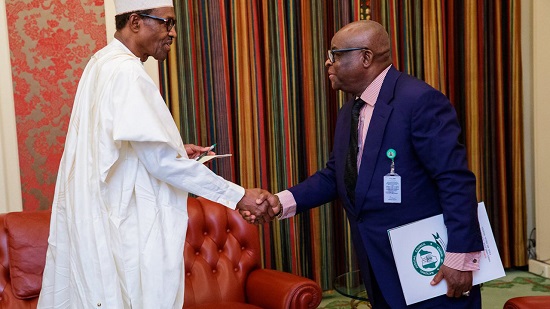Two months after he resigned as the Chief Justice of Nigeria (CJN), President Muhammadu Buhari last night in Abuja announced the acceptance of the voluntary retirement of Justice Walter Onnoghen with effect from May 28, 2019.
A statement by Senior Special Assistant to the President on Media and Publicity, Malam Garba Shehu, said Buhari thanked the former jurist for his services to the nation and wished him a meaningful retirement period.
“Meanwhile, President Buhari has accepted the voluntary retirement from service of Hon. Justice Walter Onnoghen as Chief Justice of Nigeria, effective from May 28, 2019.
“The President thanked Justice Onnoghen for his service to the Federal Republic of Nigeria and wished him the best of retirement life,” the statement said in part.
Onnoghen sent his notice of retirement to Buhari on April 5 while standing trial before the Code of Conduct Tribunal (CCT) on allegations of non-declaration of assets. He was eventually convicted on April 18 by CCT chairman, Danladi Umar, on six counts charge.
The statement also said Buhari had written the acting Chief Justice of Nigeria, Justice Tanko Muhammad, asking him to commence the process of appointing five justices to the Supreme Court to raise the number of the justices of the apex court to 21 in accordance with the provision of Section 230(2) A&B of the Constitution of the Federal Republic of Nigeria, 1999 (as amended.
According to the statement, the request was in line with the plan of the federal government to reposition the judiciary for greater efficiency.
The statement added: “President Muhammadu Buhari has written the Acting Chief Justice of Nigeria, Hon. Justice Tanko Muhammad, on the appointment of additional five Justices of the Supreme Court of Nigeria.
“The president wrote: ‘Pursuant to the provisions of Section 230(2) A&B of the Constitution of the Federal Republic of Nigeria, 1999 (as amended), I am pleased to request that you initiate in earnest the process of appointing additional five Justices of the Supreme Court of Nigeria to make the full complement of 21 Justices as provided by the aforementioned provisions of the Constitution.
‘This is in line with the government’s agenda of repositioning the judiciary in general and Supreme Court in particular for greater efficiency, with a view to reducing the backlogs of appeals pending at the Supreme Court. Please accept, your Lordship, the assurances of my highest regards.’
[ThisDay]



